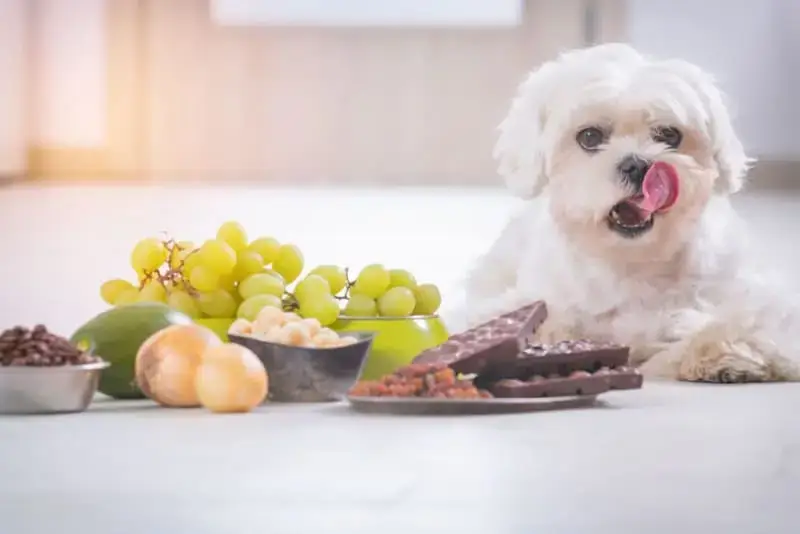We’re letting you know that this post contains sponsored links which Your Savvy Purse receives compensation for, which may impact their order of appearance.
As dog owners, we love to share our food with our furry companions — after all, they’re family, right? But while some human foods are safe for dogs in moderation, there are many that can be incredibly dangerous, even life-threatening. Some of these foods may surprise you, as they’re commonly found in our kitchens and may seem harmless. Knowing which foods are toxic to dogs can save your pet’s life.
Here are 15 foods that are surprisingly toxic to dogs, and why they should be avoided at all costs.
1. Chocolate
Chocolate is well-known for being harmful to dogs, but many owners still unknowingly share it with their pets during the holidays or as a treat. Chocolate contains theobromine, a compound that dogs can’t metabolize effectively.
Why It’s Toxic: Even small amounts can cause vomiting, diarrhea, rapid breathing, and in severe cases, seizures or death.
What to Do: If your dog eats chocolate, especially dark chocolate or baking chocolate, contact your vet immediately.
2. Grapes and Raisins
Grapes and raisins are highly toxic to dogs, though the exact compound causing the toxicity is still unknown. Even small amounts can lead to kidney failure.
Why They’re Toxic: Symptoms include vomiting, diarrhea, lethargy, and a sudden loss of appetite. In severe cases, it can lead to kidney failure and death.
What to Do: If your dog eats grapes or raisins, it’s important to call your vet right away, even if they don’t show symptoms immediately.
3. Onions and Garlic
Onions, garlic, and other members of the allium family (like leeks and chives) are harmful to dogs. These foods can cause oxidative damage to a dog’s red blood cells, leading to anemia.
Why They’re Toxic: Eating onions or garlic in any form (raw, cooked, or powdered) can lead to lethargy, weakness, and dark-colored urine.
What to Do: If your dog has consumed onions or garlic, seek veterinary help as soon as possible.
4. Xylitol (Sugar Substitute)
Xylitol is a sugar alcohol found in many sugar-free products, including gum, candy, baked goods, and even some peanut butter brands.
Why It’s Toxic: Xylitol can cause a rapid drop in blood sugar, leading to seizures, liver failure, and even death.
What to Do: If your dog eats something containing xylitol, contact your vet immediately, especially if they show signs of hypoglycemia (shaking, lethargy, or confusion).
5. Avocados
Avocados contain a substance called persin, which can be toxic to dogs, especially in large quantities.
Why It’s Toxic: The flesh, pit, and skin of the avocado all contain persin. While it’s generally safe for dogs in very small amounts, larger quantities can cause vomiting and diarrhea.
What to Do: Keep your dog away from avocados, and if they ingest a significant amount, monitor for symptoms and call your vet.
6. Macadamia Nuts
Macadamia nuts are toxic to dogs, though the exact toxin remains unknown.
Why They’re Toxic: Symptoms include vomiting, weakness, tremors, and elevated body temperature. In some cases, these symptoms can last for up to 48 hours.
What to Do: If your dog consumes macadamia nuts, contact your vet for advice, especially if they exhibit symptoms.
7. Alcohol
Alcohol, in any form, is extremely dangerous for dogs. Whether it’s beer, wine, liquor, or even foods like fruitcakes that contain alcohol, it’s best to keep these away from your pets.
Why It’s Toxic: Alcohol depresses a dog’s nervous system, leading to symptoms such as vomiting, diarrhea, difficulty breathing, and even coma or death.
What to Do: If your dog consumes alcohol, seek immediate veterinary care.
8. Coffee and Caffeine
Just like chocolate, coffee and other caffeine-containing foods or drinks are toxic to dogs. Caffeine is a stimulant, and dogs are far more sensitive to it than humans.
Why It’s Toxic: Caffeine can cause restlessness, rapid heart rate, tremors, and seizures. In severe cases, it can be fatal.
What to Do: If your dog consumes coffee, tea, or energy drinks, contact your vet immediately.
9. Raw Dough (Yeast)
While it may seem harmless, raw dough, especially dough containing yeast, can be dangerous for dogs.
Why It’s Toxic: The yeast in raw dough can expand in a dog’s stomach, causing painful bloating and gas. In addition, yeast ferments the dough, producing alcohol in the stomach, which can lead to alcohol poisoning.
What to Do: If your dog consumes raw dough, seek veterinary care immediately, especially if they show signs of bloating or discomfort.
10. Cooked Bones
While raw bones can be safe for dogs when given under supervision, cooked bones are a different story. Cooking bones makes them brittle and prone to splintering.
Why They’re Toxic: When a dog chews on cooked bones, they can splinter and cause blockages or tears in the digestive system. These can be life-threatening.
What to Do: If your dog chews on cooked bones, monitor them closely for signs of choking, blockage, or gastrointestinal distress. If you suspect a blockage, contact your vet immediately.
11. Dairy Products
While many dogs can tolerate small amounts of dairy, others may be lactose intolerant. Even if your dog isn’t lactose intolerant, large quantities of dairy can upset their stomach.
Why It’s Toxic: Dairy products can cause diarrhea, vomiting, and gas in dogs who are lactose intolerant. In some cases, they may also develop stomach cramps.
What to Do: Avoid giving your dog dairy, and opt for lactose-free alternatives if you want to offer a treat.
12. Citrus Fruits (Lemons, Limes, Oranges)
While small amounts of citrus may not harm a dog, larger quantities of citrus fruits (including the peel) can cause stomach upset and central nervous system depression.
Why They’re Toxic: Citrus contains compounds called psoralens and essential oils that can cause vomiting, diarrhea, and lethargy in dogs.
What to Do: Avoid giving your dog any citrus fruits, especially the peels, as they are more concentrated in toxins.
13. Tomatoes (Green or Unripe)
Tomatoes, specifically the green or unripe ones, contain solanine, a toxic compound that can cause gastrointestinal distress in dogs.
Why They’re Toxic: Solanine poisoning can lead to nausea, vomiting, and lethargy. The ripened fruit is generally safe in small amounts, but it’s best to avoid unripe or green tomatoes entirely.
What to Do: If your dog eats green tomatoes, watch for signs of illness and contact your vet if necessary.
14. Salt
While a small amount of salt is okay for dogs, too much can be dangerous. Dogs who consume large amounts of salty foods or who have access to salt shakers can be at risk for salt poisoning.
Why It’s Toxic: Excess salt can cause excessive thirst, urination, vomiting, diarrhea, and in severe cases, seizures or kidney damage.
What to Do: If your dog eats salty foods like chips or pretzels, watch for signs of dehydration or illness and contact your vet if symptoms worsen.
15. Coconut and Coconut Products
Coconut and its derivatives (like coconut milk or oil) can cause stomach upset in dogs, though they’re not as toxic as some other foods on this list. However, they can still be harmful in large quantities.
Why They’re Toxic: The high fat content in coconut can cause diarrhea, vomiting, and abdominal discomfort, especially in dogs with sensitive stomachs.
What to Do: Limit coconut-based treats, and keep an eye on your dog if they consume any coconut products.
In Conclusion
It’s easy to assume that certain human foods are safe for dogs, but many common items are actually toxic to our furry friends. To keep your dog safe, be mindful of what they have access to, and avoid sharing foods that could harm them. If your dog accidentally ingests any of the foods on this list, don’t hesitate to contact your vet for advice or intervention. By staying informed, you can ensure that your holiday treats are enjoyed by the whole family — including your canine companion — without any risk.
Stay safe, and remember: when in doubt, stick to dog-safe treats!



